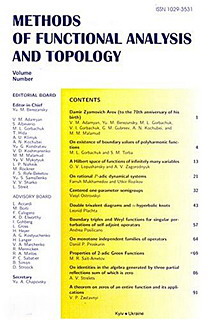Vol. 25 (2019), no. 3
Anatoly Naumovich Kochubei (to 70th birthday anniversary)
MFAT 25 (2019), no. 3, 195-196
195-196
Space of configurations and the special measures on it
MFAT 25 (2019), no. 3, 197-204
197-204
The article is devoted to an exact account of initial results about configurations and measures on them, starting from the concept of a unique topologization of the space of all configurations, including both finite and infinite cases (not as it is made in the classical works).
Limited and Dunford-Pettis operators on Banach lattices
Khalid Bouras, Abdennabi EL Aloui, Aziz Elbour
MFAT 25 (2019), no. 3, 205-210
205-210
This paper is devoted to investigation of conditions on a pair of Banach lattices $E; F$ under which every positive Dunford-Pettis operator $T:E\rightarrow F$ is limited. Mainly, it is proved that if every positive Dunford-Pettis operator $T:E\rightarrow F$ is limited, then the norm on $E'$ is order continuous or $F$ is finite dimensional. Also, it is proved that every positive Dunford-Pettis operator $T:E\rightarrow F$ is limited, if one of the following statements is valid:
1) The norm on $E^{\prime }$ is order continuous, and $F^{\prime }$ has weak$^{\ast }$ sequentially continuous lattice operations.
2) The topological dual $E^{\prime }$is discrete and its norm is
order continuous.
3) The norm of $E^{\prime }$ is order continuous and the lattice
operations in $E^{^{\prime }}$ are weak$^{\ast }$ sequentially continuous.
4) The norms of $E$ and of $E^{\prime }$ are order continuous.
Scattering problem for Dirac system with nonlocal potentials
MFAT 25 (2019), no. 3, 211-218
211-218
For a Dirac system on the half-axis, we obtain an explicit expression for the scattering operator in terms of a nonlocal potential.
Problem of determining a multidimensional thermal memory in a heat conductivity equation
D. K. Durdiev, Zh. Zh. Zhumayev
MFAT 25 (2019), no. 3, 219-226
219-226
We consider a multidimensional integro-differential equation of heat conductivity with time-convolution integral in the right hand-side. The direct problem is represented by the Cauchy problem of determining the temperature of the medium for a known initial distribution of heat. We study the inverse problem of determining the kernel, in the integral part, that depends on time and spatial variables, if a solution of the direct problem is known on the hyperplane $x_n=0$ for $t>0.$ With a use of the resolvent of the kernel, this problem is reduced to a study of a more convenient inverse problem. The later problem is replaced with an equivalent system of integral equations with respect to the unknown functions and, using a contractive mapping, we prove that the direct and the inverse problems have unique solutions.
Some results on almost Banach-Saks operators
N. Hafidi, J. H'Michane, M. Sarih
MFAT 25 (2019), no. 3, 227-235
227-235
We introduce and study a new class of operators that we call almost Banach-Saks operators. We characterize Banach lattices under which each operator is almost Banach-Saks. Furthermore, we study the relationship between this class and other classes of operators, some other interesting results are also obtained.
Unbounded translation invariant operators on commutative hypergroups
Vishvesh Kumar, N. Shravan Kumar, Ritumoni Sarma
MFAT 25 (2019), no. 3, 236-247
236-247
Let $K$ be a commutative hypergroup. In this article, we study the unbounded translation invariant operators on $L^p(K),\, 1\leq p \leq \infty.$ For $p \in \{1,2\},$ we characterize translation invariant operators on $L^p(K)$ in terms of the Fourier transform. We prove an interpolation theorem for translation invariant operators on $L^p(K)$ and we also discuss the uniqueness of the closed extension of such an operator on $L^p(K)$. Finally, for $p \in \{1,2\},$ we prove that the space of all closed translation invariant operators on $L^p(K)$ forms a commutative algebra over the field of complex numbers. We also prove Wendel's theorem for densely defined closed linear operators on $L^1(K).$
The Fourier transform on 2-step Lie groups
MFAT 25 (2019), no. 3, 248-272
248-272
In this paper, we study the Fourier transform on finite dimensional $2$-step Lie groups in terms of its canonical bilinear form (CBF) and its matrix coefficients. The parameter space of these matrix coefficients $\tilde{g}$, endowed with a distance $\rho_E$ which exchanges the regularity of a function with the decay of its Fourier matrix coefficients (cf. the Riemann-Lebesgue lemma for the classical Fourier transform) is however not complete. We compute explicitly its completion $\hat{g}$; the lack of completeness appears exactly when the CBF has nonmaximal rank. We provide an example for which partial degeneracy (partial rank loss) of the canonical form occurs, as opposed to the full degeneracy at the origin. We also compute the kernel $(w,\hat{w}) \mapsto \Theta(w,\hat{w})$ of the matrix-coefficients Fourier transform, the analogue for the $2$-step groups of the classical Fourier kernel $(x,\xi) \mapsto e^{i \langle \xi, x\rangle}$.
Eigenvalues and virtual levels of a family of 2×2 operator matrices
Tulkin H. Rasulov, Elyor B. Dilmurodov
MFAT 25 (2019), no. 3, 273-281
273-281
In the present paper we consider a family of $2 \times 2$ operator matrices ${\mathcal A}_\mu(k),$ $k \in {\mathbb T}^3:=(-\pi, \pi]^3,$ $\mu>0,$ associated with the Hamiltonian of a system consisting of at most two particles on a three-dimensional lattice ${\mathbb Z}^3,$ interacting via creation and annihilation operators. We prove that there is a value $\mu_0$ of the parameter $\mu$ such that only for $\mu=\mu_0$ the operator ${\mathcal A}_\mu(\overline{0})$ has a virtual level at the point $z=0=\min\sigma_{\rm ess}({\mathcal A}_\mu(\overline{0}))$ and the operator ${\mathcal A}_\mu(\overline{\pi})$ has a virtual level at the point $z=18=\max\sigma_{\rm ess}({\mathcal A}_\mu(\overline{\pi}))$, where $\overline{0}:=(0,0,0), \overline{\pi}:=(\pi,\pi,\pi) \in {\mathbb T}^3.$ The absence of the eigenvalues of ${\mathcal A}_\mu(k)$ for all values of $k$ under the assumption that $\mu=\mu_0$ is shown. The threshold energy expansions for the Fredholm determinant associated to ${\mathcal A}_\mu(k)$ are obtained.
On the $F$-contraction properties of multivalued integral type transformations
MFAT 25 (2019), no. 3, 282-288
282-288
The main purpose of this work is to extend the properties of multivalued transformations to the integral type transformations and to obtain the existence of fixed points under $F$-contraction. In addition, the results of this study were evaluated with some interesting example.


